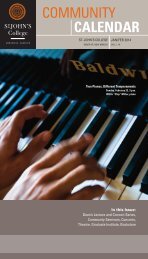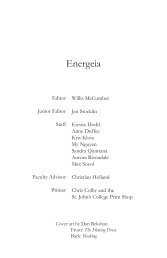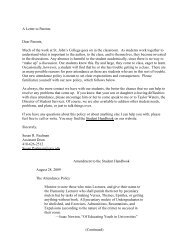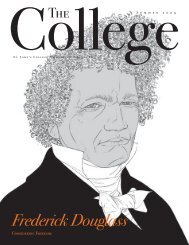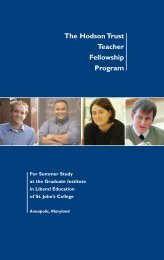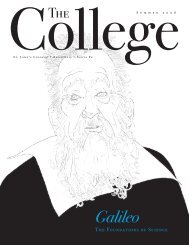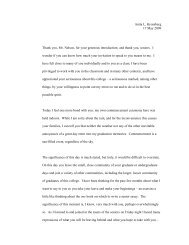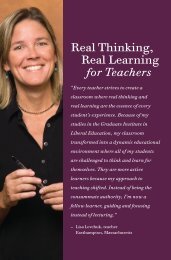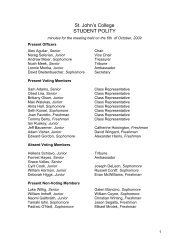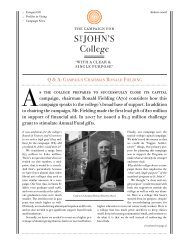âTo Meet with Macbeth,â given by tutor Louis ... - St. John's College
âTo Meet with Macbeth,â given by tutor Louis ... - St. John's College
âTo Meet with Macbeth,â given by tutor Louis ... - St. John's College
You also want an ePaper? Increase the reach of your titles
YUMPU automatically turns print PDFs into web optimized ePapers that Google loves.
Let us rather<br />
Hold fast the mortal sword, and like good men<br />
Bestride our down-fall’n birthdom.<br />
(IV.iii.2-4)<br />
It is Scotland that Macduff bestrides as protector while his family is cut down unprotected. The<br />
coordinated exits and entrances make this double action painfully clear.<br />
Thus we see for ourselves that to meet <strong>with</strong> <strong>Macbeth</strong>--having done no harm--is to invite an end<br />
like that one. What name should we give to that deed, than which there is none worse on<br />
Shakespeare’s stage? Let us look at this from another perspective. We see for ourselves what is<br />
required to make a man able to kill <strong>Macbeth</strong>. This is a hard saying. We know from the cauldron that<br />
being not of woman born is a necessary condition to harm <strong>Macbeth</strong>. But it is not sufficient. Macduff is<br />
made into <strong>Macbeth</strong>’s worthy opponent once his goodness is seen to match <strong>Macbeth</strong>’s evil in its capacity<br />
to make all causes (“Those precious motives, those strong knots of love,” IV.iii.27) give way to one great<br />
thing—Scotland, his country, his “down-fall’n birthdom.” This is a terrible goodness, dreadful as sin to<br />
Macduff who alone possesses it, and more than natural. One more thing let us try to say. This painful<br />
exhibition of child-murder shows us the foul clearly, but not the fair. Although the boy shows wit,<br />
loyalty, and an instinct for courage, his death is not fair to look upon. The filthy air is not yet clear for<br />
the fair to appear, and the will of heaven is still to be questioned.<br />
Macduff questions heaven when he hears words that Ross would prefer to “howl out in the<br />
desert air”: “Wife, children, servants, all/That could be found,” “savagely slaughtered” (IV.iii.194, 205,<br />
211-212). It takes some time for the magnitude of the loss to sink into Macduff’s soul. Five times he<br />
questions the word “all.” This is one of <strong>Macbeth</strong>’s words of transport <strong>with</strong> which Macduff must now<br />
become intimate as a man. Feeling the power of that word “all” to leave him utterly bereft and amazed,<br />
he, too, is visited <strong>by</strong> a recollection of the two worlds, earthly and heavenly, and like his wife he finds his<br />
place again in the earthly world of sin:<br />
45



